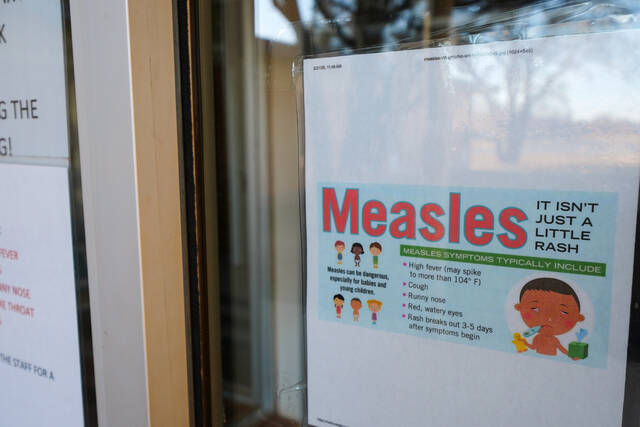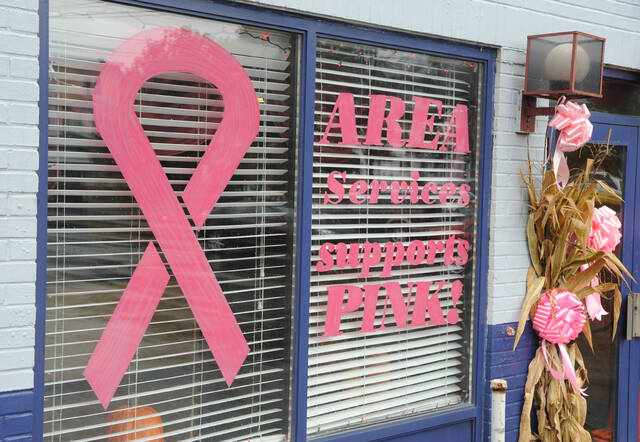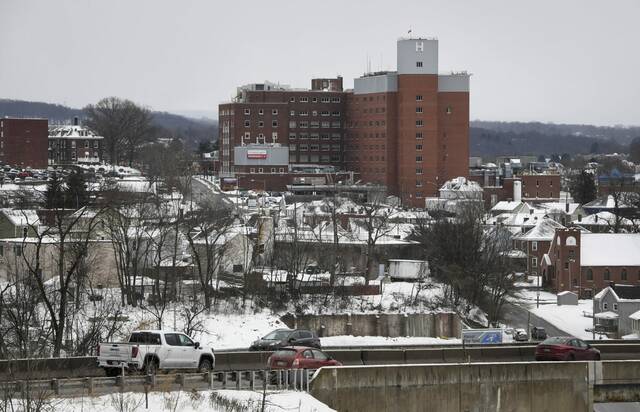Medical scrubs emblazoned with pro-worker slogans blew in the chilly wind Thursday afternoon against the backdrop of Downtown Pittsburgh’s U.S. Steel Tower, home to the corporate offices of nonprofit health giant UPMC.
Clipped to makeshift clotheslines tied to trees along Grant Street, the hospital uniform tops displayed hand-written messages such as, “Pay us what we’re worth,” “Allow us to organize” and “I work hard. I want to be able to take my kids on vacation.”
“My co-workers and I are tired of being overworked, underpaid and underinsured,” said Tinisha Brockman, a patient care technician at UPMC Presbyterian hospital in Pittsburgh’s Oakland neighborhood.
Brockman was among the more than 100 people who rallied outside UPMC’s headquarters in support of unionizing and demanding higher wages, better benefits and medical debt forgiveness.
“People say we’re ‘essential,’ but I think UPMC treats us like we’re expendable,” Brockman said.
The rally came at a time when the hospital and insurer system boasts record-high growth in revenue and advances ambitious expansion plans. UPMC is Pennsylvania’s largest nongovernmental employer.
“I’m at work more than I’m at home, and I’m burnt out,” said Brockman, who says she’s exhausted from working six days a week as UPMC and other health systems grapple with nationwide staffing shortages. “I’m still struggling to pay for everything — especially my medications. I have bad asthma, but last month I couldn’t afford to get my Flovent inhaler.”
According to UPMC officials, 43 current UPMC employees participated in the one-day protest instead of working their scheduled shifts. UPMC employs more than 93,000 people, including more than 45,000 who work in the Pittsburgh area.
“Patient services at all our hospitals proceeded without interruption today,” UPMC spokeswoman Gloria Kreps said Thursday evening. The employees who participated in the rally provided at least 10 days notice so that their absence would not disrupt services for patients.
The one-day strike, a planned walkout announced earlier this month, drew the support of Democratic elected officials from across the region, including Lt. Gov. John Fetterman, Pittsburgh Mayor-elect Ed Gainey and several state lawmakers and city and Allegheny County officials.
“This idea that you’re an essential worker, that has to be more than lip service,” Fetterman told the Tribune-Review shortly after the 90-minute rally. “An organization that takes in $23 billion a year has the resources to treat their workers well, because at the end of the day it’s the workers that make UPMC the world-class operation that it is.”
State Sen. Lindsey Williams, D-West View, said that as a nonprofit entity that does not pay real estate taxes on most of its properties, “Pennsylvanians are the ones footing the bill by subsidizing UPMC’s payroll.”
In support of the one-day walkout, more than 700 UPMC employees signed a petition seeking “$20/hour minimum wages, affordable high-quality health care, elimination of all medical debt and respect for union rights.”
Among the employee classifications: transporters, dietary workers, housekeepers, nurses, patient care techs, medical assistants, pharmacy techs, surgical techs, valets, therapists, health unit coordinators and administrative assistants.
“There’s nothing outrageous or outlandish about these demands,” Fetterman said. “The money they spend on advertising alone could raise their wages. Advertise all you want, but treat your employees right, too.”
In recent years, the National Labor Relations Board in Pittsburgh has issued orders to UPMC regarding claims of unlawful intimidation, threats and surveillance of workers and the removal of union literature from a break room at UPMC Presbyterian, Shadyside, Children’s and Mercy hospitals.
UPMC has flatly denied such retaliation and filed appeals with the NLRB.
“As a former whistleblower myself, I know it’s scary to continue to speak up after seeing your coworkers face retaliation, especially against such a large company,” Williams said. “I applaud the courage of these workers for taking a stand.”
The event drew supporters from other health care workers at systems outside UPMC as well as pro-union groups not affiliated with health care, including the United Steelworkers of America, Pittsburgh Federation of Teachers and American Federation of Labor and Congress of Industrial Organizations (AFL-CIO). They sang pro-union songs and chants such as, “Get up, get down, Pittsburgh is a union town!”
“I’m here to stand with my fellow health care workers across the country,” said Chris Boyle, an emergency room nurse for Excela Health’s hospital in Latrobe. “We need to unionize. We need help.”
Boyle, who worries about unsafe staffing levels industrywide, held a sign that read, “We’re only heroes when it’s convenient, right.”
“They can give us Chapstick and they can make Facebook posts,” she said. “I want to protect our health care workers from insane ratios; I want to protect our patients so that we can get them the care that they deserve. And if UPMC unionizes, hopefully the other hospitals in the area will as well and follow their lead.”
UPMC’s move to dole out $500 bonuses earlier this month did not appease workers who participated in the rally.
“There was no ‘thank you pay’ until we started organizing to strike,” Julia Centofanti, a pharmacy technician at UPMC Children’s Hospital in Pittsburgh’s Lawrenceville neighborhood.
UPMC officials declined to comment on allegations of unfair pay and retaliation.
John Galley, UPMC’s chief human resources officer, told the Tribune-Review earlier this month that the idea for the $500 bonuses “started with senior management, who recognized the amazing work our teams are doing.” Senior-level employees at UPMC were not eligible for the $500 bonuses.
The $46 million worth of bonuses are part of about $300 million the health care provider said it plans to spend in 2022 to improve compensation and benefits. To address staffing shortages, UPMC will increase the hourly rate when employees take on additional shifts during nights and weekends.
Similar one-day protests have been held five times in the past several years.
SEIU Healthcare does not currently represent most Pittsburgh-based UPMC employees, though efforts to galvanize employees to unionize have been brewing over the past decade. (Exceptions include Western Psychiatric Hospital and UPMC Altoona, which retained unions that existed prior to UPMC’s operation.)
Despite extra costs and challenges associated with the covid-19 pandemic, the 40-hospital nonprofit health care provider and insurer took in a record-high $23.1 billion in 2020 operating revenue and remains on track for another record-breaking year.

















